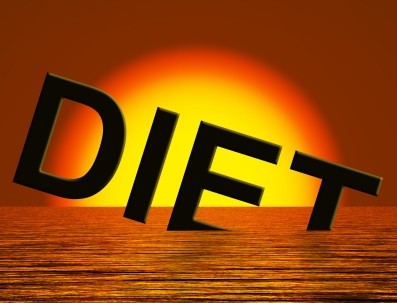Be A Healthy Eater -- Not a Dieter
/I swear, I've spent years trying to fix the damage I did to my body while dieting. That's right. Damage. I know you're thinking..."damage, wth is this chick talking about, she must be smoking something." Then again, there are those out there who can totally relate. I've finally gotten to a point where I can honestly say that I am a healthy eater, not a dieter and I'm still losing weight and feeling great!
Here's how it works. You spend years going on diets in an effort to mold your body in to what you think is your ideal body image. The diets you're using restrict you from eating various foods or entire food groups, may be too low in calories, cause you to alter your life around when and where you can eat, and ultimately you end up isolating yourself from your friends, family and social functions - all in the name of "dieting." It's just not healthy. No matter how you look at it. I've been there. I've looked at everyone's comments as nonsense and claimed that "I ate healthier than every one of them" because I was the one on a strict diet. In the end I see how unhealthy that lifestyle is.
Then there's the end result that drives you forward. The desire to be at a certain weight or certain shape and feeling like the only way to get there is with a strict dieting program. How good does it feel to be in shape? How good does it feel that your clothes are too big, or your abs are beginning to show? But what I didn't know, or failed to admit applied to me, was that dieting the unhealthy way would damage my metabolism - not just for a few months, but for years to come.
After years of contest dieting or strict dieting to get the weight off, I ended up gaining 30 lbs while still dieting and feeling like there was no way I was going to ever fix it. My metabolism was beat to death. It wasn't until I re-learned my own bodies natural feelings of satiation and fullness that my hunger cues came back. It's been almost 2 years since my last "diet" and I've finally gotten to a happy place. I've lost 7 lbs simply by adding more cardio to my weeks, not by altering my diet. And my outlook on my body is more positive now than it has been in almost 10 years.
Any diet that tells your brain you can't eat certain things is probably not the best idea. Some people are better off with a laid out diet plan, but in my experience, it's led to nothing but binge-eating and Orthorexia (an eating disorder where you obsess over dieting so much so that it in essence takes over your life). A friend of mine, Wendy, recently brought up a great point on this topic and related it to the Paleo diet. Unfortunately many of the people who read the story mistook it for a dig at the Paleo diet and caused some controversy, so Wendy took it down (she has a similar story about figure competitions here). I however, totally got it. Her point was that consciously putting yourself on a strict diet such as the Paleo diet, or any other diet turns in to a psychosocial issue that can lead you down a slippery slope of depression, binges and eating disorders, not to mention you could end up with a metabolism the speed of a snail. Not fun.
What I'm trying to say is that putting a label on the way you eat can psychologically mind-f*ck you in to a downward spiral of yo-yo dieting and depression. So whenever I'm asked at my CrossFit box if I'd like to participate in the 30-day Paleo challenge, my answer is always no. Just the word diet might set me off. The thought of depravation, timed meals and psychotically weighing every morsel of food that I put in my mouth is already making me want to stop at 7-11 for a pint of ice cream.
"It's not a diet, it's a healthy lifestyle."
I know much of this rant goes against an article I posted only a few days ago, but it really doesn't. In that article I made a suggestion that you take the guidelines I laid out and apply them to your life just as they are - guidelines. Use them as a tool to guide you through your daily meals and alter it to fit your life and preferences. There's no rule that says you have to measure everything precisely and stick with the plan to the T in order to get results. In fact, it can be quite the opposite. Giving yourself loose guidelines to follow will only help you transfer a conscious effort in to an unconscious effort - a lifestyle change.
Do yourself a favor and leave the OCD at the door. Pay attention to your body and eat naturally nutritious foods that are satisfying and good for you. Get an idea and an understanding of what goes in to a healthy eating plan for someone who is physically active and try to eat like that. Have protein with every meal, enjoy fruits and veggies, nuts, oils and other healthy fats, and a small amount of complex carbs. If you feel like having dessert at Sunday dinner, enjoy and don't worry about it. It's when you obsess and spend too much time thinking about the dessert that leads to a binge followed by guilt. Free your mind and your body will follow.








